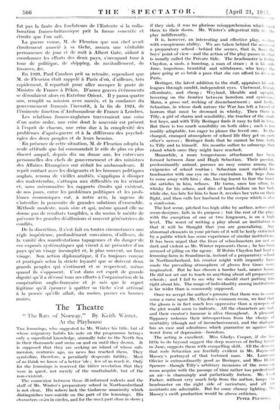The Theatre
" The Rats of Norway." By Keith Winter. At the Playhouse
THE lemmings, who suggested to Mr. Winter his title, but of whose migratory habits his note on the programme betrays only a superficial knowledge, annually take to the North Sea in their thousands and swim on and on until they drown. It is supposed that they are seeking an island of whose sub- mersion, centuries 'ago, no news has reached them. They Symbolize, therefore, a peculiarly desperate futility. Most of us think we know of a better 'ole ; few of us reach it. Only for the lemmings is reserved the bitter revelation that they were in quest, not merely of the unattainable, but of the non-existent.
The connexion between these ill-informed 'rodents and the staff of Mr. Winter's preparatory school in Northumberland is not clear. His ushers lack the Gadarene unanimity which distinguishes race-suicide on the part of the lemmings. His characters sw'on in circles, and for the most part close in shore ;
if they sink, it was no glorious misapprehension which hired them to their doom. Mr. Winter's allegorical title tits the play indifferently.
It is, however, an interesting and effective play, written with conspicuous ability. We are taken behind the scenes of a preparatory school—behind the scenes, that is, from the boys' point of view—and the action of the play passes in what is usually called the Private Side. The headmaster is Robin Claydon, a snob, a humbug, a man of straw ; it is his wife Jane, imperious, beautiful and withdrawn, who keeps the place going at so brisk a pace that she can afford to dress in Paris.
Beringer, the latest addition to the staff, appraises his col- leagues through candid, independent eyes. Chetwood, finical, effeminate, and cheap ; Weyland, likeable and upright, hovering on the frontier between boredom and cynicism; Mann, a gross oaf, reeking of disenchantment ; and lastly, Sebastian, in whose dark nature the War has left a brood of horrors that must be drowned in whisky.. Then there is Tilly, a girl of charm and sensibility, the teacher of the smal- lest boys, and 'with Tilly Beringer finds it easy. to fall in love. But there is too much sensibility on both sides ; each is too readily adaptable, too eager to please the loved one. In the charged, cramped atmosphere of school life they get on each other's nerves ; Beringer finds that he cannot be true both to Tilly and to himself. Six months suffice to submerge that island which once they might' have reached;
Meanwhile, a more tempestuous attachment has been formed between Jane and Hugh Sebastian. Their passion, predominantly animal, pursues no easy course among the exigencies of school routine ; Sebastian must cuckold his headmaster with one eye on the curriculum. He begs Jane to come away with him ; she, having learnt to fear the beast she satisfies in him, refuses. He turns, once too often, to whisky for his solace, and dies of heart7failure on her bed, while she, too late for him to hear it, revokes her veto on their Hight, and then calls her husband to the corpse which is also a confession.
The last scene, pitched too high alike by anthor, actors and scene-designer, fails in its purpose ; but the rest of the play, with the exception of one or two longueurs, is on a high level. The worst of writing a play about an institution is that it will be thought that you are generalizing. Any abnormal elements in your picture of it will be hotly criticized by a public which has some experience of similar institutions. It has been urged that the lives of schoolmasters are not so dark and violent as Mr. Winter represents them ; he has been accused of piling on the agony. If Robin Claydon had kept a lemming-farm in Scandinavia, instead of a preparatory school in Northumberland, his creator might with impunity have made the prevailing atmosphere of gloom five times more inspissated. But he has chosen a harder task, nearer home. He did not set out to teach us anything about all preparatory schools ; and I fail to see why we should start putting him right about his. The range of individuality among institutions is far wider than is commonly supposed.
Once we accept the authors premise that there was in some sense a curse upon Mr. Clay-don's common room, we find that the gloom is in fact much less oppressive than a synopsis of the plot would seen' to indicate. All the characters are real, and their creator's humour is alive throughout. A pleasant flippancy redeems their introspection from the charge of morbidity (though not" of inconclusiveness), and the dialogue has an ease and adroitness which guarantee us against the worst form of depression—boredom. The acting is excellent. Miss Gladys Cooper, if she has little to do beyond suggest the deep reserves of feeling latent in Jane, suggests them with compelling skill. All the demons that rode Sebastian are fearfully evident in Mr. Raymond Massey's portrayal of that tortured man. Mr. Laurence Olivier is extraordinarily good as Beringer, and Miss Helen Spencer—though Tilly's arbitrary invasions of the comnion room acquire with the passage of time rather too predestined an air—is charmingly and • pathetically forlorn. Mr. Cecil Parker, without very much' help from the author, keeps t he headmaster on the right. side of caricature, and all his assistants are admirable. But for some clumsy lighting, Mr. Massey's swift production would be above criticism. .
PETER FLEMING.






































 Previous page
Previous page